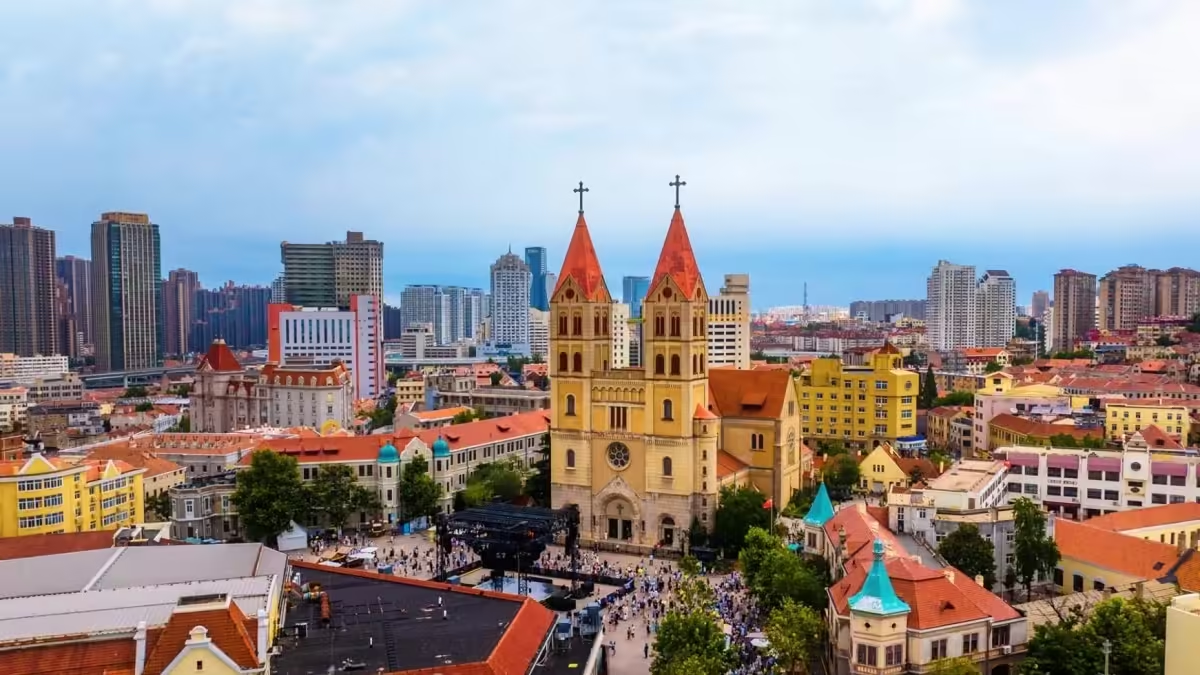Qingdao, a coastal city in eastern China, boasts a rich history that spans over 6,000 years. From early human settlements to becoming a modern-day metropolis, Qingdao’s evolution reflects the complex cultural, political, and economic changes that have shaped the region over millennia. Here’s an overview of Qingdao’s fascinating history, from the Neolithic era to its present-day prominence.
Neolithic Era: The Dawn of Civilization
Qingdao’s history dates back to around 6,000 years ago, during the Neolithic period, when the region was inhabited by the Dongyi people, a matriarchal clan known for their farming activities. These early settlers developed agriculture, which led to the domestication of animals and hunting. Additionally, their proximity to the ocean fostered the development of marine fishing practices, laying the foundation for Qingdao’s deep connection to the sea. Archaeological discoveries from this period have revealed a rich and diverse culture, exemplified by the Dawenkou and Longshan cultures, which thrived in the area.
Shang and Zhou Dynasties: The Birth of Salt Production
During the Shang (1600–1046 BCE) and Zhou (1046–256 BCE) dynasties, Qingdao became one of China’s earliest centers for salt production. The region earned its place as one of China’s “Four Ancient Salt Areas” and “Five Ancient Ports,” thanks to its abundant natural resources. The early development of salt extraction and trade would go on to play a significant role in the local economy, fostering commerce and cultural exchanges with neighboring regions.
Qin and Han Dynasties: Imperial Visits and Expansion
After Emperor Qin Shi Huang unified China in 221 BCE, Qingdao continued to gain importance. The first emperor himself visited Langya (present-day Huangdao District) three times, demonstrating the strategic significance of the region. Additionally, Emperor Wu of the Han Dynasty, who ruled during the 2nd century BCE, spent his early years as the Prince of Jiaodong. Known for his fondness of Qingdao, he visited the region more often than any other Chinese emperor. Under the Han Dynasty, Qingdao’s prominence grew, cementing its role in China’s imperial landscape.
Song and Yuan Dynasties: A Thriving Maritime Hub
By the Song Dynasty (960–1279), Qingdao had become a key player in international trade. In 1088, the government established a Maritime Trade Office in Banqiao Town, Mishu Prefecture, to manage sea trade and foreign relations. This made Qingdao the only northern port open to international commerce during the Song era. The Yuan Dynasty (1271–1368) further expanded the region’s maritime connections by opening the Jiao-Lai Canal in 1282, linking Jiaozhou Bay to the nearby coastal areas. This period saw bustling trade, with ships crowding the bay and warehouses lining the shores, signaling the golden age of Qingdao’s maritime trade.
Ming and Qing Dynasties: A Defensive Stronghold
In the Ming Dynasty (1368–1644), Qingdao emerged as a vital military stronghold, serving as a key part of China’s northern coastal defenses. Qingdao’s strategic location made it an important site for guarding against foreign invasions and pirate attacks. By the Qing Dynasty (1644–1912), Qingdao’s trade and commercial activities continued to flourish. Jinjiakou (present-day Jinkou in Jimo) became a prominent trading hub, with merchant ships traveling between northern and southern China. In 1891, the Qing government formally established military defenses in Jiaozhou Bay, marking the official founding of Qingdao as a city. Seven years later, in 1898, the city was named “Qingdao” and opened to the world as a free port, signaling its international importance.
Post-1949: Modern Qingdao and Economic Development
Following the founding of the People’s Republic of China in 1949, Qingdao underwent rapid modernization and economic reform. In 1984, the city was designated one of 14 coastal cities open to international trade and investment, driving significant growth in industry, infrastructure, and tourism. In 2019, Qingdao hosted the first-ever Asia Agricultural Expo at its World Expo City, reflecting its continued status as a center for global commerce and innovation.
From its ancient origins as a fishing and farming community to its modern role as a global trading hub and tourist destination, Qingdao’s history is a testament to its enduring importance in Chinese history. With its vibrant cultural heritage and strategic location, Qingdao continues to thrive, offering visitors a blend of history, tradition, and modernity.

